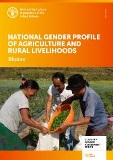Publications

Addressing gender issues in pesticide management
17/05/2023
This brochure highlights the gender-related implication of pesticide use and management, focusing on the role of women in handling hazardous pesticides in agriculture, the reasons why they are at higher risk and the health-related implications they face. 20 pp.

Bhutan: Country Gender Assessment of agriculture and the rural sector (Country Gender Assessment Series)
17/05/2023
Bhutanese women are vital players in the food security and nutrition landscape. However, there still remain gender inequalities and constraints. This assessment analyses the agricultural and rural sector of Bhutan from a gender mainstreaming perspective in areas where FAO assists in realizing rural women’s rights and potential. 84 pp.

Making the AfCFTA work for women in the agrifood sector
16/05/2023
This policy brief examines the role of the AfCFTA in addressing gender-related challenges in trade facilitation faced by women agripreneurs and traders across sub-Saharan Africa. 11 pp.

FAO Europe and Central Asia Gender Newsletter, April 2023 – Issue #10
08/05/2023
This issue of the FAO Europe and Central Asia Gender Newsletter explores the need for gender-responsive action in addressing the war in Ukraine, earthquakes and drought risk in the region, a regional gender and social protection workshop with gender experts and why necessity for agroecology. 7 pp.

The gender-responsive Business Model Canvas
08/05/2023
This brief outlines how closing the gender gap and ensuring equal access to agricultural support services is a priority in sub-Saharan Africa (SSA) as well as in the Near East and North Africa (NENA), where FAO has made a strong commitment to promoting efficient, inclusive and sustainable agrifood value chain development, with particular attention to the inclusion and empowerment of rural women and youth. 26 pp.

Sustainable mechanization as a means to empower women processors in Benin
01/05/2023
This flyer presents the gender responsive approach to mechanization piloted in Benin. 2 pp.

Guide to formulating gendered social norms indicators in the context of food security and nutrition
25/04/2023
This guide is designed for programme formulators and implementers, and monitoring and evaluation specialists responsible for creating and implementing M&E frameworks and systems for food security, agriculture and nutrition programmes. 44 pp.

The status of women in agrifood systems
13/04/2023
Moving beyond agriculture, The status of women in agrifood systems reflects not only on how gender equality and women’s empowerment are central to the transition towards sustainable and resilient agrifood systems but also on how the transformation of agrifood systems can contribute to gender equality and women’s empowerment. 264 pages.
